 Abraham Lincoln
If given the truth, the people can be depended upon to meet any national crisis...
Abraham Lincoln
If given the truth, the people can be depended upon to meet any national crisis...
 Guildford news...
for Guildford people, brought to you by Guildford reporters - Guildford's own news service
Guildford news...
for Guildford people, brought to you by Guildford reporters - Guildford's own news service
Updated: You Don’t Believe Us! Angry Residents Tell New Thames Water CEO
Published on: 14 Apr, 2024
Updated on: 22 Apr, 2024
Still angry customers of Thames Water met the new chief executive officer of Thames Water, Chris Weston, at a public meeting in Godalming and focused their criticism on the company’s compensation payments.
See report of previous meeting here: Thames Water Representatives Face Angry Residents Who Suffered Loss of Water Supply
Speaker after speaker recounted stories of how claims had been rejected while some residents who had suffered no interruption of supply had received payments. One man said he and his direct neighbours had received different amounts of compensation despite all experiencing exactly the same water supply outages in November. He said Thames Water did not believe him despite his spreadsheets kept because of previous problems claiming compensation in 2022.
At times Jeremy Hunt, the MP for Surrey South West, who with Guildford MP Angela Richardson had organised this meeting, found it difficult to keep control as members of the audience interrupted, determined to have their say.
Mr Hunt, remarking that Thames Water remains in the lowest quartile of water companies rated by performance, opened the meeting by listing the problems customers had faced or were still were facing:
- 18,000 homes experienced water outages in November, some additionally on Boxing Day;
- there was massive disruption, with schools closed, hospitals concerned, those registered as vulnerable unable to get bottled water supplies and local businesses losing money including a pub in Witley that lost £10,000 in a single day;
- there was an increase in sewage leaks last year;
- terrible communications issues made it difficult to find out what was going on during the outages and for people to receive due compensation.
There was, he said, general dissatisfaction with service levels, and it was still to be confirmed that the system now has the required resilience. “But on top of all of that,” he said, “we read in the national press that Thames Water shareholders have been requesting Ofwat to increase bills by 40 per cent to pay for poor management and financial engineering by Thames Water’s previous owners and I just want to say on behalf of my constituents it will be utterly outrageous and totally unfair if we were made to pick up the tab for poor management.”
See also: ‘What Is Ofwat Doing?’ Asks a Customer
CEO Chris Weston responded by apologising. “What happened in early November should not have happened,” he said, “Thames [Water] should have been able to avoid that. And I am very sorry for the inconvenience and stress that it caused everyone. I would also like to apologise for the way that communications were handled and also complaints have been handled.”
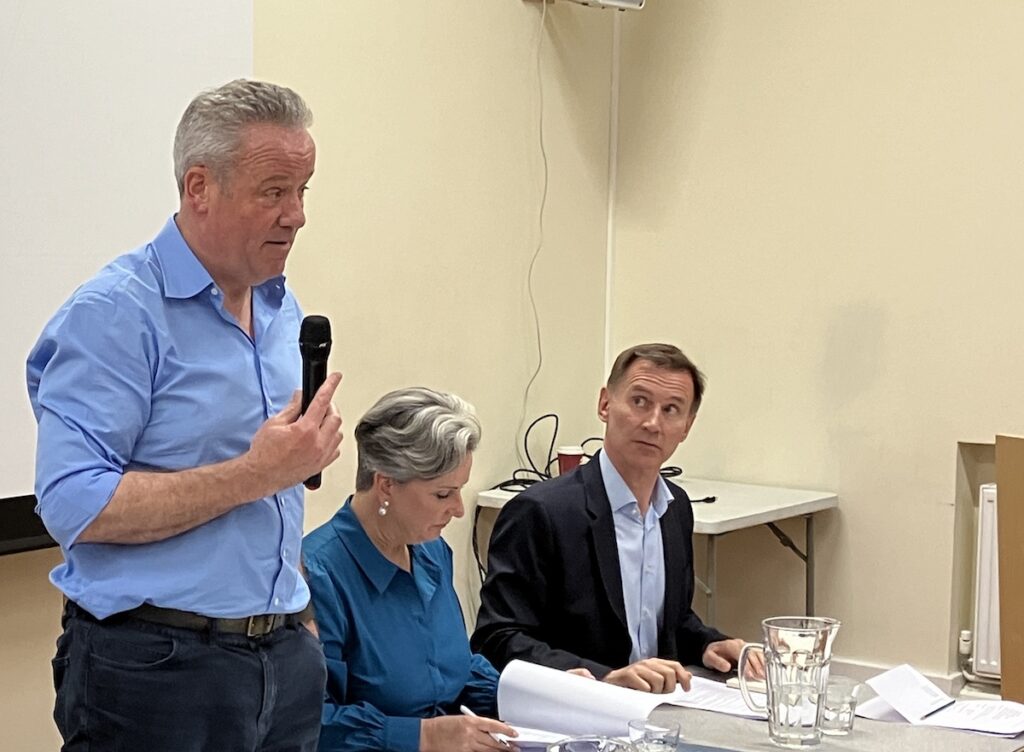
Chris Weston, the new CEO of Thames Water, responding to questions and criticisms. Next to him are Angela Richardson and Jeremy Hunt.
He said he had visited some of the affected TW sites. “When you go to these treatment works, it is very clear that they are in need of investment and that they have not had the investment that they have needed for many years, I suspect a decade, and that is a pity and we are doing our best to rectify that now. Power quality is an issue in this area and part of what happened in early November was down to power fluctuations. We’ve made changes [and introduced] portable generators and UPS [uninterrupted power supply] and that has all been tested and has been found to operate.”
He also appeared to announce that all Thames Water customers in the area would receive £30 whether they suffered an interruption in their water supply or not. He said: “We recognise that we have not done a good enough job. So we have announced today that we are paying a further £30 pounds to every house that is served by us in this area. So that is 26,000 homes. And on top of that, in addition to that we are paying another £30 to those that have complained or felt they had to complain because our service has not been what it should be. We are very sorry for what happened.”
UPDATE: However it has subsequently been clarified that only customers affected would receive the blanket £30 payment. See: Thames Water Clarify Compensation Payments.
Amanda Clegg, who organised a Facebook group for people in her area who had suffered problems with their water supply and subsequent compensation claims, said she had identified 105 properties that had been denied compensation, and a further 75 that felt they’d been inadequately compensated for the days they were without water.
Ms Clegg continued by giving examples. One person received £120 pounds even though she didn’t at any point lose water. A customer who queried a £60 automatic payment as insufficient had £30 pounds of it reclaimed. A disabled resident who had had water delivered to her when she was cut off had been denied compensation. Another householder was advised that they would receive £150, which they thought was actually a bit too much for the time they were without water, but had nothing paid. A local business was forced to close because they had no water and yet they had been denied any compensation.
These were just a few of the anomalies, she said, and asked: “So how does Thames Water purport to have robust modelling of water supply when it clearly has no reliable data? Why is Thames Water so unwilling to share their calculations with us so that we can independently check? We have an email thread promising the data in good time for this meeting, which we have not had. So what is Thames Water going to do about this situation?”
Mr Weston said he and his colleagues would work through the list presented “as best we can”. But he then admitted that Thames Water had to rely on customer reports. He said: “We do model what we think the impact is on homes in an area where there is a loss of water supply. It is not easy to do at all. And one of the issues we have is we can’t see what the exact impact is on each individual household. We just don’t have the technology to do that. We have some smart meters, but not a lot of customers [have them]. And so we do rely on feedback from customers.”
Jeremy Hunt reminded the meeting that at the previous meeting in December Thames Water gave a commitment that they would sort out all the compensation issues by the end of January. “As you can see, that has not happened,” he said.
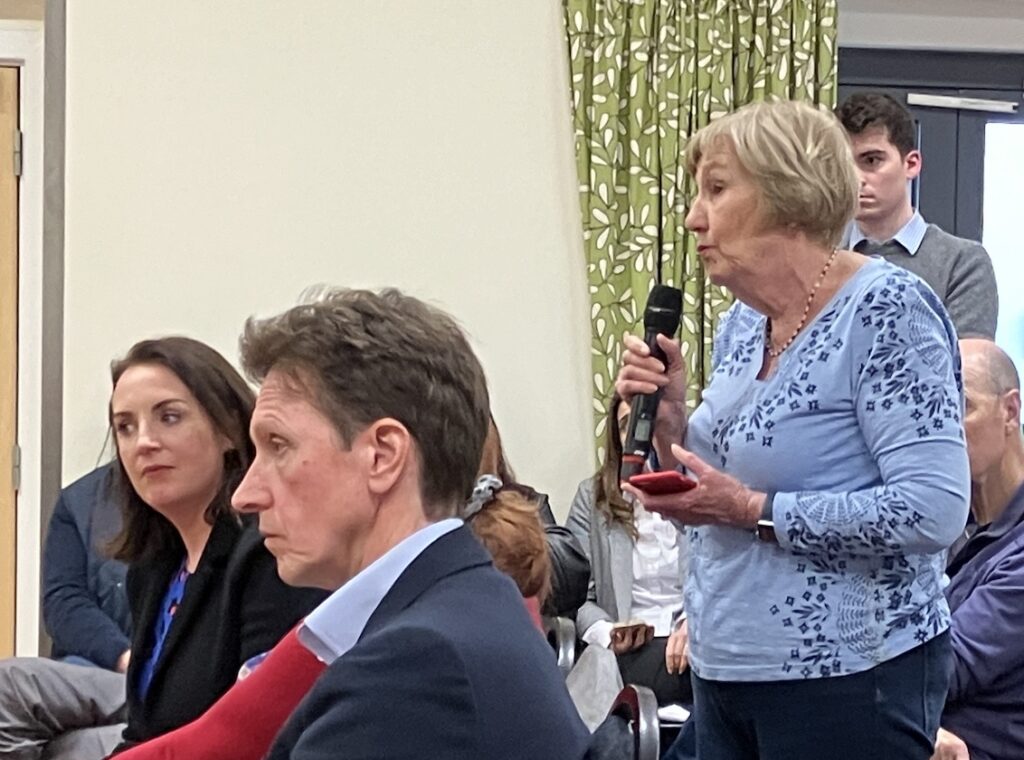
Angela Gilmore: the most hurtful thing was the feeling that Thames water seemed to believe she was lying, she said.
Angel Gilmore of Milford House said she and her fellow residents were without a water supply for three days and had bottled water delivered to them but while neighbours had received compensation she and her fellow residents had received none because Thames Water claimed that they had only suffered low pressure. She said it was the apparent belief of Thames Water that she was lying that she found the most hurtful, a complaint that attracted spontaneous applause.
The Thames Water boss responded to her directly: “Angela, I’m very sorry that that we made you feel like you’re a liar. That is absolutely not the case. I’m very happy that we sit down I will sit down with you and we can try and work out how we rectify the situation.”
The leader of Waverley Borough Council, Paul Follows (Lib Dem), said he was one of those who had had his water supply interrupted. He continued: “I think we can be pretty sure that Thames Water’s primary allegiance is to their shareholders,” and his question to the two Conservative MPs was: “When will your bill nationalising Thames Water be brought before the House?”
He added: “I know that everyone in this room will have made up their mind about privatisation. So I’m going to just try and give some facts about why I think we have the problems today. Since privatisation, £180 billion pounds has been invested in upgrading our national water supply systems.
“It is not credible to think that if they had remained nationalised, that level of capital investment would have gone into our water systems, given the other pressures on the public sector.
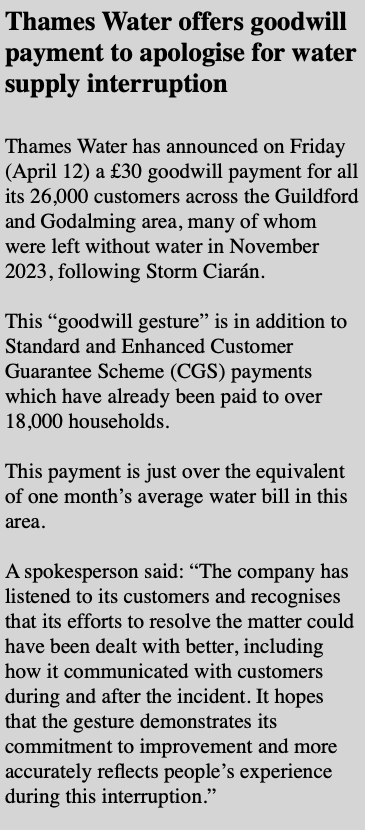 “However, it was not enough. And the reason it’s not enough is that successive governments, including the Blair government, the coalition government and the current government, have regulated water companies for too long on the basis that their number one priority is keeping bills down. And we have not had enough investment in the system. That is now changing. That is why water companies have submitted plans were £96 billion of investment in the next five years.
“However, it was not enough. And the reason it’s not enough is that successive governments, including the Blair government, the coalition government and the current government, have regulated water companies for too long on the basis that their number one priority is keeping bills down. And we have not had enough investment in the system. That is now changing. That is why water companies have submitted plans were £96 billion of investment in the next five years.
“There’ll be some people in this room who disagree, but I think our priority should not be ideological. It should be to take the decisions that mean the maximum amount of money is invested in upgrading our water infrastructure and that is what we have to do.”
Cllr Follows, who was asked after the meeting what he felt about Jeremy Hunt’s response, said: “Shareholders are the people that Thames Water are really responding to, they’re the people they care about the most. And that’s why they don’t believe customers because actually, their duty is to their shareholders to make them money.
“Of course they don’t believe customers because they don’t want to give them any money back. So a natural, critical piece of infrastructure like water needs to be nationally owned. And Jeremy gave no answers to that and that’s because they don’t want to admit, in general, any privatisation was wrong.
“Now, he makes a spurious conjecture that because of privatisation more money has gone into the system. We know with Thames Water that is impossible, because how much money has gone out in bonuses, in shareholder dividends, or in fact, just left the country completely?”
Asked if he felt there should be a connection between building more houses and adequate infrastructure he responded: “Thames Water should speak to the residents in Alfold. One or two houses yes, I can see that doesn’t really impact the system, but once you get 200 here and 300 there and 500 there, of course, there starts to be a wider problem which they don’t then address. So I think they do need to take more responsibility and be held to account in the planning system. Planning should happen without the infrastructure but the government doesn’t do anything about that.”

Click on cartoon for Dragon story: Public Asked for Views on SCC’s Proposal for Reduced Speed Limits



Recent Articles
- Motorcyclist Arrested After Police Chase
- Notice: GTA German Filmfest – July 2
- Letter: We Need More Yellow Boxes and Enforcement
- Notice: What’s On in July at Guildford Cathedral
- Greenfield, Greenbelt Site Deemed ‘Greybelt’ by Planning Inspector
- Letter: WBC’s CIL Recommendations Are Too Little, Too Late
- Letter: Yellow Box Fines Are Just a Money-raising Opportunity for SCC
- Drivers Caught in Yellow Box Junctions at the Dennis Roundabout Paid £81k to SCC
- Residents Hit By CIL Fees Should Be Offered Full Review, Says Overview Committee
- Plans For New Guildford Preschool Rejected On Road Safety Grounds


Search in Site
Media Gallery
Dragon Interview: Local Artist Leaves Her Mark At One of England’s Most Historic Buildings
January 21, 2023 / No Comment / Read MoreDragon Interview: Lib Dem Planning Chair: ‘Current Policy Doesn’t Work for Local People’
January 19, 2023 / No Comment / Read MoreA3 Tunnel in Guildford ‘Necessary’ for New Homes, Says Guildford’s MP
January 10, 2023 / No Comment / Read More‘Madness’ for London Road Scheme to Go Ahead Against ‘Huge Opposition’, Says SCC Leader
January 6, 2023 / No Comment / Read MoreCouncillor’s Son Starts Campaign for More Consultation on North Street Plan
December 30, 2022 / No Comment / Read MoreCounty Council Climbs Down Over London Road Works – Further ‘Engagement’ Period Announced
December 14, 2022 / No Comment / Read MoreDragon Interview: GBC Reaction to the Government’s Expected Decision to Relax Housing Targets
December 7, 2022 / No Comment / Read MoreHow Can Our Town Centre Businesses Recover? Watch the Shop Front Debate
May 18, 2020 / No Comment / Read More



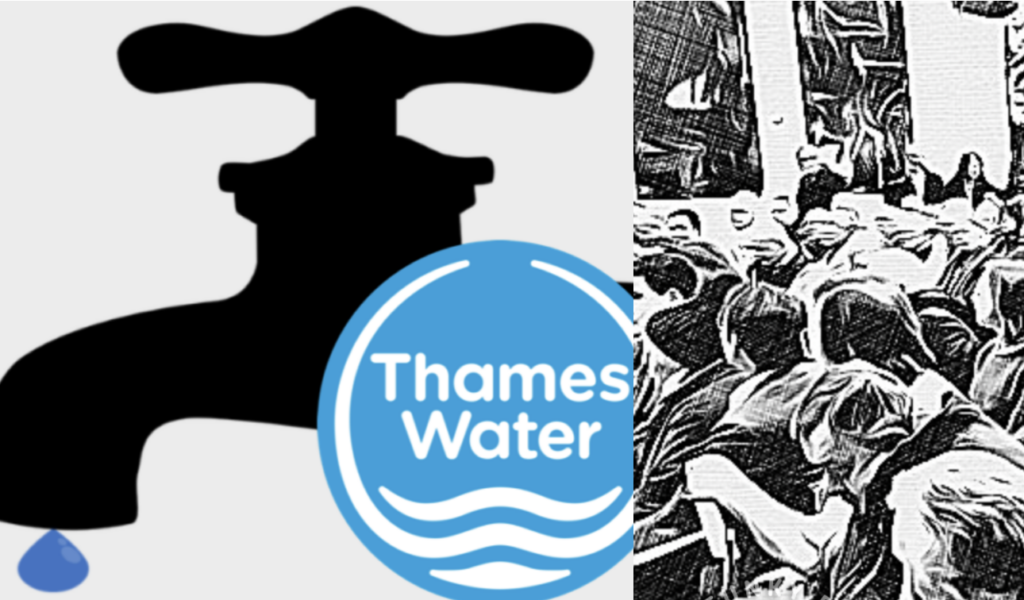
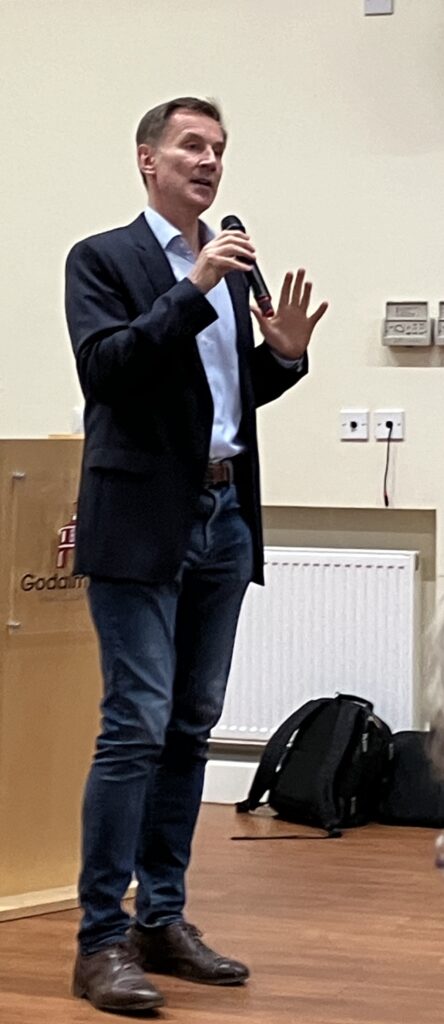
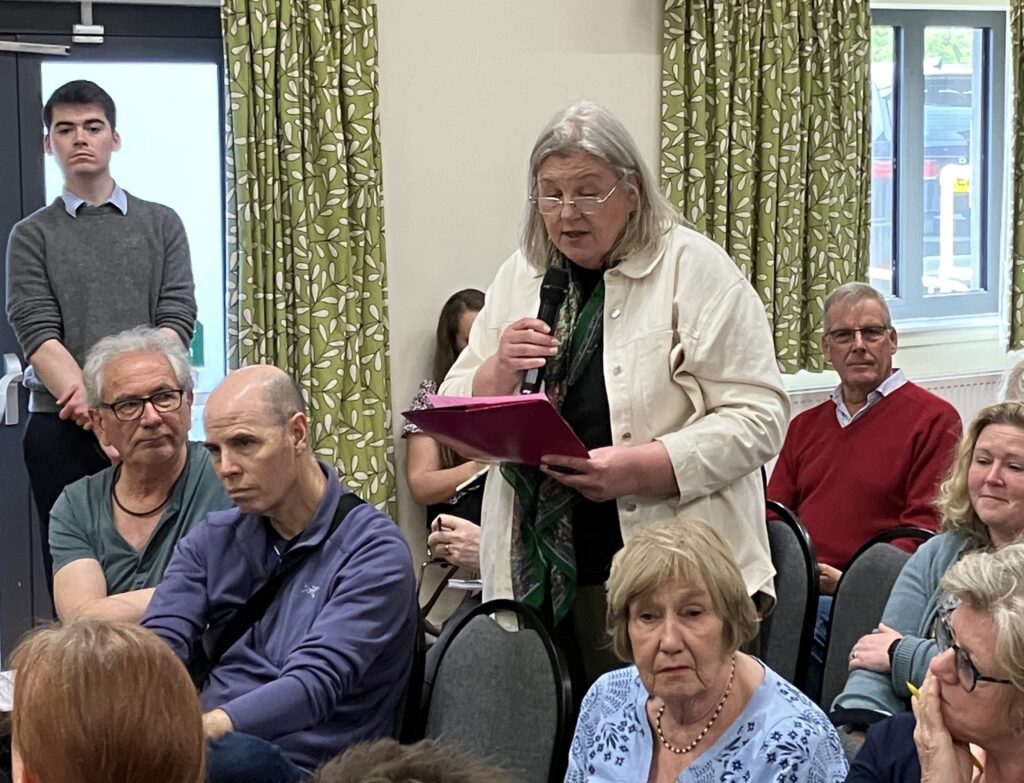
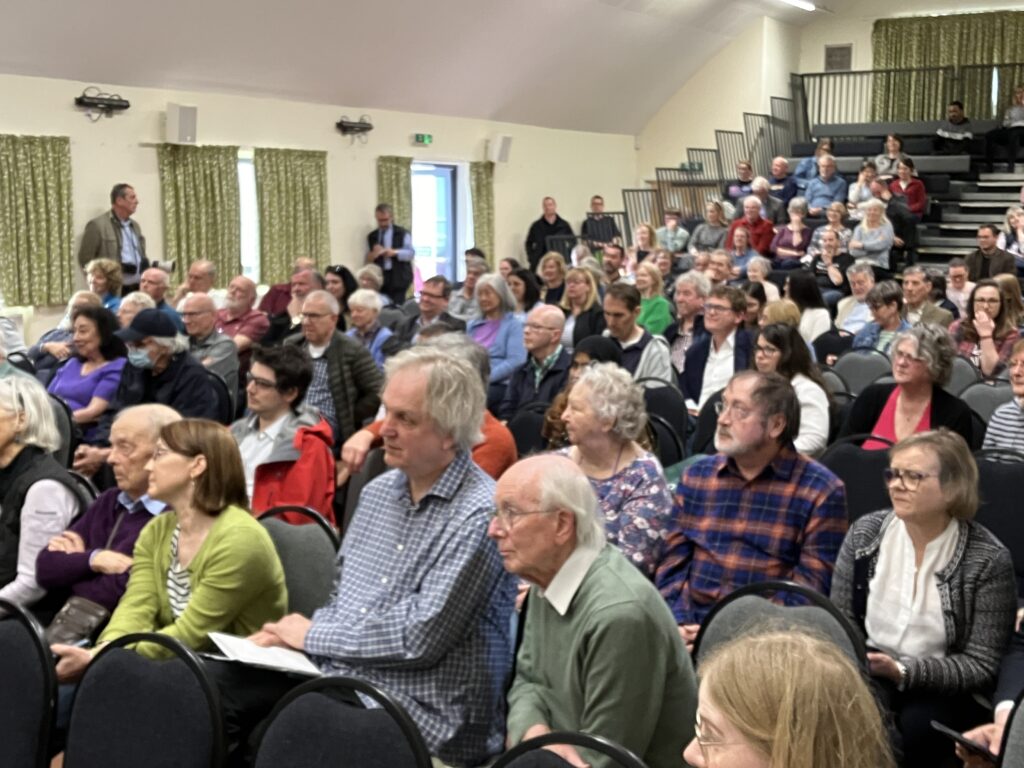
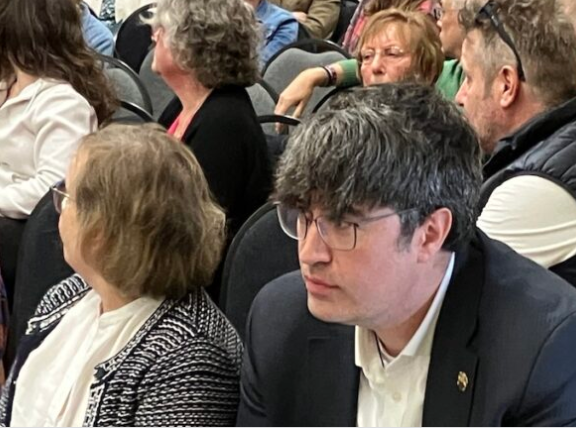



Recent Comments